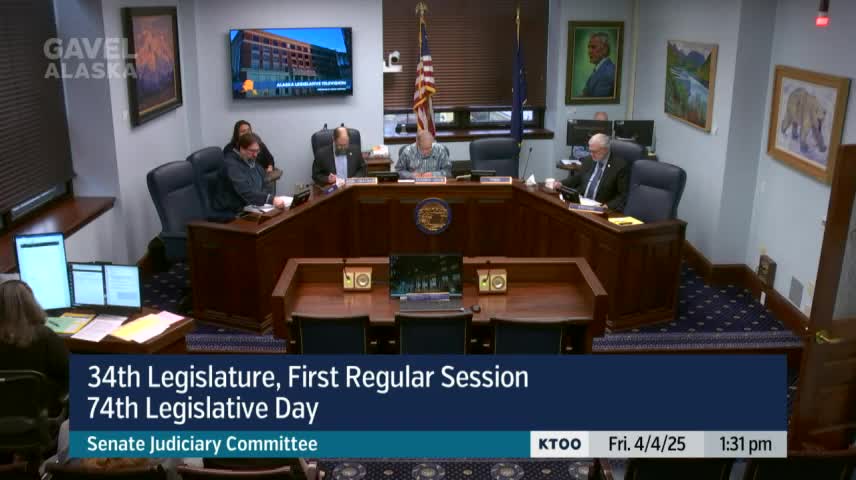Legal expert tells Alaska Senate Judiciary Committee constitution requires prompt joint-session reconsideration of vetoes
Get AI-powered insights, summaries, and transcripts
Subscribe
Summary
April 4, 2025 — The Alaska Senate Judiciary Committee heard expert testimony that the state constitution requires the Legislature to meet promptly in joint session and reconsider each vetoed bill or line-item when a veto is delivered during a session.
April 4, 2025 — The Alaska Senate Judiciary Committee heard expert testimony that the state constitution requires the Legislature to meet promptly in joint session and reconsider each vetoed bill or line-item when a veto is delivered during a session.
Susan Orlansky, a private-practice attorney in Anchorage who researched the constitutional text and historical materials for the committee, told senators the language and early legislative practice point to a mandatory obligation. "The first sentence of article 2 section 16 says very explicitly, 'Upon receipt of a veto message during a regular session of the legislature, the legislature shall meet immediately in joint session and reconsider passage of the vetoed bill or item,'" Orlansky said. "The constitution uses the word shall, which is a word of requirement."
Orlansky said her review of the constitutional convention minutes, the actions of the first legislature and the Legislature’s own Rule 45 all support a reading that joint-session reconsideration must occur promptly and that "promptly" cannot mean an undue or open-ended delay. She noted that Rule 45 mirrors the constitutional instruction: when a veto is returned while the Legislature is in session, the house of origin must note the veto and the other house is "promptly requested to meet in joint session to reconsider passage of the vetoed bill or item." Orlansky also cited the constitution's separate five-day rule that applies if the Legislature is not in session when the veto is delivered, saying that statute suggests five days is an outside limit in the reconvening scenario and that waiting more than five days in-session would likely not meet the constitution's promptness requirement.
Committee members pressed several practical and legal questions. Senator Stevens asked for confirmation of a narrow point: the five-day timing rule applies "after we have reconvened," not as a period for calling members back into session. Orlansky agreed. Senators Myers and others raised a recent example in which lawmakers met in joint session and voted on one budget veto while leaving other vetoed line items and bills unaddressed; Myers said that practice appears to conflict with the constitutional reading presented at the hearing.
Senators also debated whether a motion to adjourn a joint session—used, for example, when leaders conclude there are not the votes to override a veto—could satisfy the constitution. Orlansky said she had not researched every permutation but offered her view: "I read the constitution as requiring the legislature in joint session to vote on the veto within 5 days. Every veto." Several senators argued about whether a package vote on multiple vetoes would meet the requirement or whether individual items must be separately reconsidered; the committee discussed specific language in the resolution that references the Legislature meeting in joint session on Jan. 18, 2024, and whether that episode set a clear precedent.
Committee members asked about judicial enforcement. A senator noted memoranda suggesting a potential lawsuit, while another memo cited the Alaska Supreme Court’s general reluctance to tell the Legislature how to conduct its business. Orlansky said the court is often hesitant to dictate legislative procedure but added there may be a distinction between enforcing the constitution and policing internal legislative rules: "There may be a difference between telling the legislature whether the legislature is following its own rules ... versus the Supreme Court telling the legislature whether it's abiding by the constitution."
There was no public testimony on the resolution. The committee chair set the resolution aside for further review and said members may file amendments electronically by noon on Monday, April 7. No formal committee vote on SCR 1 was recorded at the hearing.
The discussion could affect how the Legislature responds to future gubernatorial vetoes and whether litigation over omitted vetoes is more likely if the committee or either house declines to act on every vetoed item in joint session.
Members indicated the committee will continue to consider the Senate Concurrent Resolution and suggested drafters may revise the whereas clauses to more fully reflect recent practice and history.
